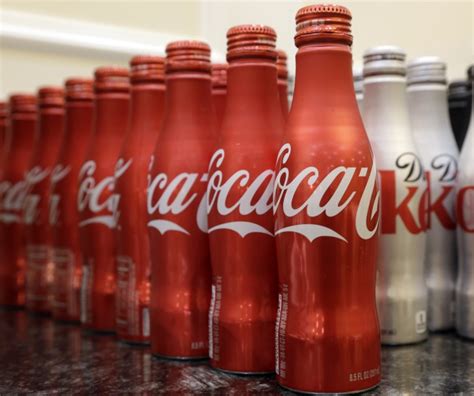
Coca-Cola is grappling with declining sales and a damaged reputation following the widespread circulation of a viral video that purportedly exposed questionable practices within the company. The beverage giant is now scrambling to mitigate the fallout, implementing damage control strategies and reassessing its public relations approach in the face of mounting consumer backlash.
The controversy ignited after a video, rapidly shared across social media platforms, allegedly revealed Coca-Cola employees engaging in unethical or unsavory activities. While the specifics of the video remain somewhat contested and subject to interpretation, its impact on public perception has been undeniable. The company’s stock price has seen a noticeable dip, and several major retailers are reportedly considering reducing their Coca-Cola product offerings, according to industry analysts.
“We are aware of the video circulating online and take these allegations extremely seriously,” a Coca-Cola spokesperson stated. “We are conducting a thorough internal investigation and will take appropriate action based on the findings. Coca-Cola is committed to upholding the highest ethical standards in all aspects of our business.”
The viral video’s emergence coincides with growing consumer awareness of corporate social responsibility and ethical sourcing. Increasingly, consumers are factoring in a company’s values and practices when making purchasing decisions, particularly among younger demographics. This shift in consumer behavior has placed added pressure on major corporations like Coca-Cola to maintain a squeaky-clean image and address any controversies swiftly and decisively.
The Viral Video: A Catalyst for Crisis
The exact content of the viral video is a subject of considerable debate and speculation. Initial reports suggested that the video depicted Coca-Cola employees allegedly mishandling product ingredients, engaging in discriminatory practices, or contributing to environmental damage. However, Coca-Cola has vehemently denied these claims, stating that the video has been edited and misrepresented to create a false narrative.
Regardless of the video’s authenticity, its impact on Coca-Cola’s reputation has been substantial. The video quickly gained traction on platforms like Twitter, Facebook, and TikTok, reaching millions of viewers within a matter of days. The hashtag #BoycottCocaCola began trending globally, with consumers expressing outrage and vowing to boycott the company’s products.
Sales Figures Take a Hit
The consumer backlash triggered by the viral video has had a direct impact on Coca-Cola’s sales figures. According to data from market research firm Nielsen, Coca-Cola’s sales volume in the United States has declined by approximately 5% since the video began circulating. This decline is particularly pronounced among younger consumers, who are more likely to be influenced by social media trends and ethical considerations.
Several major retailers have also reported a decrease in Coca-Cola product sales. Walmart, Target, and Kroger, three of the largest retailers in the US, have all indicated that they are closely monitoring the situation and considering adjusting their product offerings based on consumer demand. Some smaller retailers have already removed Coca-Cola products from their shelves entirely, citing concerns about reputational damage and customer loyalty.
Coca-Cola’s Response: Damage Control and Reputation Repair
Coca-Cola has launched a multifaceted response to address the crisis, focusing on damage control, reputation repair, and internal investigation. The company has issued several public statements denouncing the allegations made in the viral video and reaffirming its commitment to ethical business practices.
“We want to assure our consumers that Coca-Cola is committed to the highest standards of quality, safety, and ethical conduct,” the company said in a statement. “We take any allegations of wrongdoing extremely seriously and are conducting a thorough investigation to determine the facts. We will not hesitate to take appropriate action if any violations of our policies or values are found.”
In addition to public statements, Coca-Cola has also engaged in direct outreach to key stakeholders, including retailers, distributors, and investors. The company has held meetings with these stakeholders to address their concerns and provide them with updates on the internal investigation.
Coca-Cola has also ramped up its public relations efforts, launching a series of initiatives aimed at promoting its corporate social responsibility and sustainability programs. The company has highlighted its efforts to reduce its environmental impact, support local communities, and promote diversity and inclusion within its workforce.
However, these efforts have been met with mixed reactions. Some consumers have praised Coca-Cola for taking swift action to address the crisis, while others remain skeptical and demand more transparency and accountability.
The Broader Implications: Corporate Social Responsibility in the Age of Social Media
The Coca-Cola controversy highlights the growing importance of corporate social responsibility in the age of social media. In today’s hyper-connected world, companies are increasingly vulnerable to reputational damage caused by viral videos, social media campaigns, and online activism.
Consumers are no longer simply passive recipients of marketing messages; they are active participants in shaping public perception and holding companies accountable for their actions. This shift in power dynamics has forced companies to prioritize ethical business practices and invest in robust corporate social responsibility programs.
“Companies need to understand that their reputation is their most valuable asset,” said Paul Argenti, a professor of corporate communication at Dartmouth College. “In the age of social media, a single viral video can destroy years of hard work and damage a company’s brand for good. It’s essential for companies to be proactive in addressing ethical concerns and building a strong reputation for social responsibility.”
The Coca-Cola crisis serves as a cautionary tale for other companies, underscoring the need to be vigilant in monitoring social media, addressing ethical concerns promptly, and investing in robust corporate social responsibility programs.
The Future of Coca-Cola: Navigating the Crisis and Rebuilding Trust
The future of Coca-Cola remains uncertain. The company faces a significant challenge in rebuilding trust with consumers and restoring its reputation. The success of its efforts will depend on its ability to address the underlying concerns raised by the viral video, demonstrate a genuine commitment to ethical business practices, and effectively communicate its values to the public.
Coca-Cola needs to be transparent about the findings of its internal investigation and take decisive action to address any wrongdoing that is uncovered. The company also needs to invest in long-term initiatives to promote corporate social responsibility and sustainability.
Ultimately, Coca-Cola’s ability to navigate this crisis and rebuild its reputation will depend on its willingness to listen to consumers, learn from its mistakes, and adapt to the changing expectations of the modern marketplace. The road ahead will undoubtedly be challenging, but Coca-Cola has the resources and expertise to overcome this crisis and emerge as a stronger and more socially responsible company.
The Rise of Alternative Beverages
The Coca-Cola controversy also coincides with a broader trend: the growing popularity of alternative beverages. Health-conscious consumers are increasingly turning away from sugary sodas and opting for healthier alternatives like sparkling water, kombucha, and plant-based drinks. This trend has put added pressure on Coca-Cola to diversify its product offerings and cater to changing consumer preferences. The negative publicity surrounding the viral video could accelerate this shift, further impacting Coca-Cola’s market share. The company will need to innovate and adapt to remain competitive in an evolving beverage landscape.
Long-Term Brand Impact
The long-term impact of the viral video on the Coca-Cola brand is difficult to predict. However, brand reputation experts suggest that the damage could be significant and lasting, particularly among younger consumers who are more likely to be influenced by online activism and social media trends. Studies have shown that negative brand experiences, especially those amplified by social media, can have a profound and enduring impact on consumer perceptions and purchasing behavior. Coca-Cola will need to engage in sustained and authentic efforts to rebuild trust and repair its brand image over the long term. This will require more than just reactive damage control; it will necessitate a fundamental shift in corporate culture and a renewed commitment to ethical and sustainable practices.
Employee Morale and Internal Culture
The viral video and subsequent backlash could also have a negative impact on employee morale and internal culture at Coca-Cola. Employees may feel demoralized by the negative publicity and concerned about the company’s future. It is crucial for Coca-Cola to address these concerns and create a supportive and inclusive work environment. This includes open communication, transparency, and a commitment to addressing any issues of misconduct or unethical behavior. A strong and engaged workforce is essential for Coca-Cola to navigate this crisis and rebuild its reputation. The company must invest in its employees and foster a culture of integrity and accountability.
Supply Chain Scrutiny
The controversy surrounding the viral video has also led to increased scrutiny of Coca-Cola’s supply chain. Consumers and advocacy groups are demanding greater transparency and accountability in the sourcing of ingredients and the manufacturing of products. Coca-Cola will need to demonstrate that its supply chain is ethical and sustainable, and that it is taking steps to address any potential risks of human rights abuses or environmental damage. This includes working with suppliers to ensure fair labor practices, reducing water usage, and minimizing waste. A responsible and sustainable supply chain is not only essential for protecting the environment and human rights, but also for maintaining consumer trust and brand reputation.
Legal and Regulatory Challenges
Depending on the nature of the allegations in the viral video and the findings of Coca-Cola’s internal investigation, the company could face legal and regulatory challenges. Government agencies could launch investigations into potential violations of consumer protection laws, labor laws, or environmental regulations. Coca-Cola could also face lawsuits from consumers or other stakeholders who claim to have been harmed by the company’s actions. These legal and regulatory challenges could be costly and time-consuming, and they could further damage Coca-Cola’s reputation. It is essential for Coca-Cola to cooperate fully with any investigations and to take appropriate action to address any violations of law.
Frequently Asked Questions (FAQs)
1. What exactly is the viral video about, and what allegations does it make against Coca-Cola?
The specifics of the viral video are somewhat contested, but it purportedly shows Coca-Cola employees engaging in unethical or unsavory activities. Initial reports suggested allegations of mishandling product ingredients, discriminatory practices, or environmental damage. Coca-Cola has denied these claims, stating the video is edited and misrepresented. The exact content remains a subject of debate, but its impact on public perception is undeniable.
2. How has the viral video affected Coca-Cola’s sales and stock price?
Coca-Cola’s sales volume in the United States has declined by approximately 5% since the video began circulating, according to Nielsen data. The decline is particularly noticeable among younger consumers. The company’s stock price has also seen a noticeable dip. Several major retailers are reportedly considering reducing their Coca-Cola product offerings, adding to the financial impact.
3. What steps is Coca-Cola taking to address the crisis and repair its reputation?
Coca-Cola has launched a multifaceted response that includes: public statements denouncing the allegations and reaffirming its commitment to ethical business practices; direct outreach to key stakeholders like retailers, distributors, and investors; ramping up public relations efforts to highlight its corporate social responsibility and sustainability programs; and conducting a thorough internal investigation to determine the facts and take appropriate action.
4. What is the broader significance of this situation in terms of corporate social responsibility and social media?
The Coca-Cola controversy highlights the growing importance of corporate social responsibility in the age of social media. Companies are increasingly vulnerable to reputational damage caused by viral videos and online activism. Consumers are more active in shaping public perception and holding companies accountable for their actions. Companies must prioritize ethical business practices and invest in robust corporate social responsibility programs to maintain trust and brand reputation.
5. What are the potential long-term consequences for Coca-Cola’s brand and future?
The long-term impact is difficult to predict but could be significant, particularly among younger consumers. Coca-Cola faces challenges in rebuilding trust and restoring its reputation. The success of its efforts will depend on its ability to address the underlying concerns, demonstrate a genuine commitment to ethical business practices, effectively communicate its values, and adapt to changing consumer expectations. Potential consequences include a lasting negative impact on brand perception, a shift towards alternative beverages, challenges to employee morale, and increased scrutiny of its supply chain.
The Coca-Cola Controversy: A Deep Dive into Brand Crisis Management
The Coca-Cola incident presents a critical case study in modern brand crisis management, underscoring the complexities and challenges businesses face in the digital age. A viral video, regardless of its veracity, can ignite a firestorm of negative publicity, potentially eroding consumer trust and impacting financial performance. The speed at which information disseminates online necessitates a rapid, strategic, and transparent response.
The Anatomy of a Viral Crisis
Viral crises often follow a predictable pattern. First, an incident occurs – in this case, the emergence of a video alleging unethical practices. Second, the incident is amplified through social media, often accompanied by outrage and calls for action. Third, mainstream media picks up the story, further amplifying the reach and impact. Finally, the company faces mounting pressure to respond and mitigate the damage.
In the Coca-Cola case, the rapid spread of the video on platforms like TikTok and Twitter fueled public anger and prompted the #BoycottCocaCola movement. The story quickly escalated from social media chatter to mainstream news headlines, forcing Coca-Cola to address the situation head-on.
Key Elements of Effective Crisis Management
Successful crisis management involves several key elements:
- Swift Response: Delaying a response can exacerbate the situation, allowing negative narratives to solidify. Coca-Cola’s initial statement acknowledging the video and announcing an internal investigation was a necessary first step.
- Transparency: Openly communicating with stakeholders, including consumers, retailers, and investors, is crucial for building trust. Coca-Cola’s statements emphasized its commitment to ethical conduct and transparency.
- Accountability: Taking responsibility for any wrongdoing, even if unintentional, is essential for demonstrating sincerity. Coca-Cola’s pledge to take “appropriate action” based on the investigation’s findings was a step in this direction.
- Empathy: Understanding and acknowledging the concerns of stakeholders is vital for demonstrating genuine concern. Coca-Cola needed to show that it understood the public’s outrage and was committed to addressing their concerns.
- Action: Words alone are not enough. Companies must take concrete steps to address the underlying issues that triggered the crisis. Coca-Cola’s ramped-up public relations efforts and focus on corporate social responsibility were intended to demonstrate its commitment to positive change.
Beyond Damage Control: Rebuilding Trust
While damage control is essential in the immediate aftermath of a crisis, rebuilding trust requires a more long-term and comprehensive strategy. This involves:
- Addressing the Root Cause: Identifying and addressing the underlying issues that contributed to the crisis is crucial for preventing future occurrences. Coca-Cola’s internal investigation needed to delve into the specific allegations and identify any systemic problems.
- Investing in Corporate Social Responsibility: Demonstrating a genuine commitment to ethical and sustainable practices is essential for rebuilding trust with consumers. Coca-Cola’s efforts to reduce its environmental impact, support local communities, and promote diversity and inclusion were intended to showcase its commitment to corporate social responsibility.
- Engaging with Stakeholders: Actively listening to and engaging with consumers, employees, and other stakeholders is vital for understanding their concerns and building stronger relationships. Coca-Cola needed to engage in open dialogue and solicit feedback from its stakeholders.
- Communicating Authentically: Transparency and honesty are essential for building credibility. Coca-Cola needed to communicate its actions and progress in a clear, honest, and authentic manner.
Lessons Learned from the Coca-Cola Crisis
The Coca-Cola crisis offers several valuable lessons for businesses navigating the complexities of the digital age:
- Be Prepared: Develop a comprehensive crisis communication plan that outlines roles, responsibilities, and procedures for responding to potential crises.
- Monitor Social Media: Actively monitor social media channels to identify potential issues early and respond quickly.
- Empower Employees: Train employees to identify and escalate potential issues.
- Build Relationships: Cultivate strong relationships with stakeholders, including consumers, employees, and the media.
- Embrace Transparency: Be open and honest in all communications.
- Act Ethically: Prioritize ethical and sustainable practices in all aspects of the business.
The Influence of Generation Z and Millennial Consumers
The Coca-Cola controversy also highlights the significant influence of Generation Z and Millennial consumers. These demographics are more likely to be influenced by social media trends and ethical considerations when making purchasing decisions. They are also more likely to boycott companies that they perceive as unethical or irresponsible.
Coca-Cola and other businesses must adapt to the changing preferences and values of these consumers. This requires a greater focus on corporate social responsibility, sustainability, and transparency. Companies must also be prepared to engage with these consumers on social media and address their concerns directly.
The Power of Online Activism
The Coca-Cola crisis demonstrates the power of online activism. Social media platforms have empowered consumers to organize, share information, and hold companies accountable for their actions. Online activism can quickly amplify negative publicity and create significant reputational damage.
Businesses must be prepared to respond to online activism and engage with activists in a constructive manner. This requires understanding their concerns, addressing their grievances, and working collaboratively to find solutions.
Navigating the Future of Brand Reputation
In an increasingly interconnected and transparent world, brand reputation is more important than ever. Businesses must prioritize ethical and sustainable practices, communicate openly and honestly, and engage with stakeholders in a meaningful way. By doing so, they can build trust, foster loyalty, and navigate the challenges of the digital age. The Coca-Cola case serves as a stark reminder of the potential consequences of failing to prioritize brand reputation and the importance of proactive crisis management. The road to recovery will be long, but with transparency, accountability, and a genuine commitment to ethical practices, Coca-Cola can begin to rebuild trust and restore its brand image.









